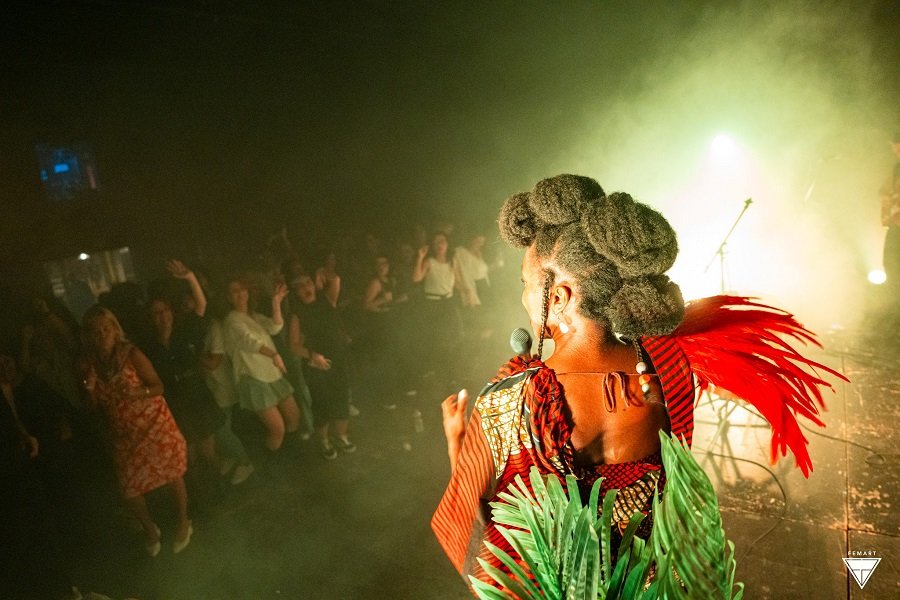By: Gili Hoxhaj
When you see Lucia de Carvalho on a concert poster, you immediately feel that you have to listen to her. There’s something special about her style, and she blends so many different sounds. But I never expected her to walk on stage exactly as she appears in the poster—wearing the same outfit, holding the same instrument, with the same sneakers, the same hairstyle, and that same warm smile. She’s an artist who gives the audience exactly what she promises. From the very first song, you can’t help but dance along. “I’m here with you and for you,” she says to the crowd. With her instrument in hand and a smile that feels like it’s connecting with you personally, she fills the room with a joyful energy that’s impossible to resist. “This is my first time here, and I hope it won’t be the last,” she shared with the audience between songs. On the third night of “FemArt,” she brought the creative spark of her album “Pwanga,” and I was captivated not only by the music but also by the inspiring story behind the album’s title.
Lucia has a unique way of connecting with others, especially helping people tell their personal stories to build self-esteem. While working on a project in Angola, where she is from, her friend asked the women farmers she was working with to pose for a photo. Lucia noticed that none of them were smiling. A translator suggested she gather the group and ask them in Chokëe, “Pwanga ni puy?” (Light or darkness?). To her surprise, all the women responded with “Pwanga!” and smiled as the room was filled with light. Lucia strives to carry that light with her music, spreading it wherever she goes, and that’s exactly what happened at the “Oda” Theater in Pristina. She became one with the music and the audience, joined by a group of talented musicians, and herself playing percussion.
Although Lucia is from Angola, she had to move to France at the age of 6 due to the civil wars. This experience created an immediate bond with Kosovo. “When I learned about the history here, I thought, ‘Wow, this is a land of freedom,’” the singer shared, bowing to the ground. She then moved into the song “Phowo,” which translates to “Woman.”
“It’s about the divine and the human, how we give birth to the world, the water and food that make us feel alive. It’s a powerful song,” Lucia explained. And indeed, her performance was nothing short of magical, filled with deep spirituality. Throughout 13 songs, she explored her diverse musical style, embracing polar forces that challenge everything: doubt and belief, kindness and power, complexity and harmony, chaos and peace, mystery and clarity. The unity in her performance was astonishing, especially considering she sings in six languages and blends various genres such as samba, semba, Afrobeat, rap, rock, reggae, funk, and Latin pop. This vast musical range comes from Carvalho’s complex identity: born in Angola, moved to Portugal at six, adopted by a French family at twelve, and later joining a Brazilian ensemble at sixteen, performing with them for ten years before launching her solo career as a singer-songwriter. The self-portrait she crafted through music reflects her Angolan roots, Portuguese influence, and Brazilian flair, all nurtured in France. This blend of cultures resonated so deeply that even actress Aurita Agushi found herself swept away by the rhythm of her world.
“For nearly two hours, Lucia de Carvalho transported me to a world full of beauty, life, and color—a world where love reigns above everything,” remarked actress Aurita Agushi.
Her album Yallah sends waves of good energy through the world’s turmoil. Despite the chaos, Lucia was seen holding on tightly to the light and love within herself. We all experienced her journey together, celebrating not only her passion but her bravery as Lucia appeared on stage exactly as she is—with her past and present, and with the stories of those around her. She shared our collective emotions, making the audience feel connected to her story as if it were our own.
“Love transcends,” said Lucia, reflecting on her song Yallah. “Wars force people to place themselves against one another, but love doesn’t care about the differences. ‘Yallah’ is a word that pushes us to keep moving forward with love in our hearts and peace in our minds,” she said before performing the song titled Yallah, meaning “Let’s go.” Venera Ismaili from Artpolis explained that they were drawn to Lucia’s energy and wanted to bring that to FemArt, where her powerful musical expressions perfectly matched the festival’s theme.
“Lucia, with her unique style that merges cultures and personal experiences, empowers women and delivers strong messages of equality, strength, and peace. She reminds us of how art can be used to tell women’s stories and bridge cultures, creating FemArt as a genuine space for solidarity and international sisterhood,” Venera commented. Her captivating voice and calm energy invited closeness. This became even more apparent when Lucia left the stage and entered the audience, dancing together with them. Unity can always be created with music—not only by singing and dancing on stage but by singing and dancing together. Unity is created with musicians like Lucia and evenings like this one at FemArt. Lucia aims to plant light with her music—and she did just that in Pristina, her light full of colors, planted in the heart.

